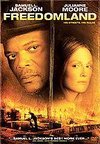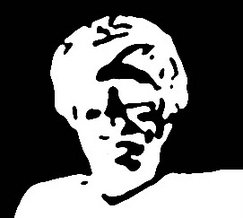Talking Pictures #1

“Freedomland” (2006)
Starring: Samuel L. Jackson, Julianne Moore
Director: Joe Roth
You know, sometimes I wish I paid a little more attention to a film’s production credits before handing over my money at the cinema. If I’d done this with “Freedomland”, I may have put two hours of my life to better use. On the surface, the involvement of Samuel L. Jackson and Julianne Moore was a considerably attractive proposition; however, had I dug a little deeper, the potential rot would have been apparent. Director Joe Roth and screenwriter Richard Price previously collaborated on 1986’s “Streets Of Gold”, a pretty mediocre boxing movie that was probably going cheap in my local video rental store when I saw it. A glance at their respective CVs for the intervening years is equally unpromising, birthing one-viewing-is-too-many yawnfests such as “Ransom” (1996) and “America’s Sweethearts” (2001). Need I mention that Roth also directed 1987’s “Revenge Of The Nerds II: Nerds In Paradise”? Some might say that I’m belabouring my point, but probably not Roth and Price, who do this with abandon throughout “Freedomland”.
The synopsis of “Freedomland” seemed promising enough. Playgroup worker Brenda Martin (Moore) staggers into a clinic, covered in blood, the apparent victim of a carjacking. The traumatised Martin subsequently reveals that her four year old son was in the back of the car when it was stolen. Veteran police detective Lorenzo Council (Jackson), self-appointed guardian of the housing projects where the alleged assault and kidnapping occurred, attempts to solve the case before the intervention of a neighbouring police force ignites a race riot.
“Freedomland” gets off to a strong start, visually, with a muted, detached credits sequence that evokes Brenda Martin’s traumatised condition as she walks to the clinic. However, almost from their first words, both Moore and Jackson’s roles come across as stock-in-trade, the actors’ not-insubstantial screen presence struggling to compensate for the flaws in dialogue and characterisation. Potentially strong support from Edie Falco, William Forsythe and Ron Eldard is also undermined, either by two dimensional plotting or unfocused direction. The inconsistencies in the plot and characters’ actions become increasingly irritating. There’s a very early example of this, in Martin’s willingness to be interviewed alone by Detective Council, even allowing him to remove keys from her pocket as her hands are bandaged. All this despite claiming her assailant was a black male. Subsequently, the (seemingly exclusive) black residents of the projects feel understandably aggrieved at the excessive police presence in response to the missing boy, given that a similar case involving a black child elicited a lesser response from the authorities. Whilst this is entirely plausible, what is less convincing is the residents’ reaction to the police’s search for the black suspect. Given that the crime occurred in a (seemingly exclusive) black neighbourhood - I didn’t notice any attempt to represent residents of other colours - it actually seems reasonable that the police would accept Brenda Martin’s description of her assailant and focus their search accordingly.
By this stage, both the writer and director seem to lose the plot so completely that it’s little wonder that the viewer isn’t far behind. To be honest, I even wondered if Roth and Price had been fired mid-production and their replacements had little idea how to resolve the film, so jarring is the first hour from the second. The second half’s resulting search for the missing child in a derelict children’s home (the “Freedomland” that gives the film it’s name) should provide necessary resolution. However, like me, you will probably have predicted the ‘twist’ and long given up caring by this point. Price’s screenplay is adapted from his own novel, so I have to question whether the source material was equally unsatisfying and, if so, how on earth it got the green light as a movie. With Samuel L. Jackson and Julianne Moore’s prolific output, I can almost forgive the fact that they’ll be involved in the occasional stinker. With a much slighter filmography between them, Joe Roth and Richard Price don’t get off so lightly. I’ll be keeping an eye on those pesky production credits in future, if only to spy Roth and Price’s names in the ‘small print’ and avoid wasting my time and money on their films.
“Freedomland”’s tagline is:
“The Truth Is Hiding Where No One Dares To Look”.
I suspect that there was a typo. Replace ‘dares’ with ‘cares’ and you’ll get a much more accurate summation of this film.



2 Comments:
Hi Bro',
Haven't seen it but your comments mirror what I've been reading elsewhere.
I wonder who's to blame? Roth seems to be taking most of the flak for his inability to handle both racial tension and an underlying mystery in the same package.
Having said that, I'm rarely in favour of writers adapting their own novels. They often lack objectivity and try to include what they feel are the best bits of the novel rather than trying to construct a usable screenplay. In fact, in my opinion adaptations are best suited to the small screen, over several hours. This is probably a case in point. The original novel was something like 500 pages. 500 pages into 113 minutes, mmm, something's got to give.
I'm not saying Price is a bad writer but a novel and a screenplay are entirely different beasts and not many writers are equally skilled in the required techniques. I often prefer to see those immortal words, 'inspired by the novel...' because often this shows that the writer has simply taken the themes of a novel to create a standalone screeplay. It's no guarantee, of course. Just as often the phrase actually stands for 'A complete bastardization of a freakin' great, bestselling book that I, with my lack of original thought, what to leech some bucks from'.
But you know what I mean. In 99% of cases, if you really want to make a book into a movie, let a professional handle the writing duties. It worked for Spike Lee with another Price novel, Clockers...
I think what made matters worse is that I've managed to visit the cinema the grand total of three times in 2006, A Cock And Bull Story and King Kong being the others. Good though the former was, I didn't expect it to be the best of the bunch so far!
Maybe I need to accelerate this spiralling descent in quality and see "The Da Vinci Code". Hopefully, I will then have got the worst out of the way and can recommence some quality film viewing...! :-)
Post a Comment
<< Home